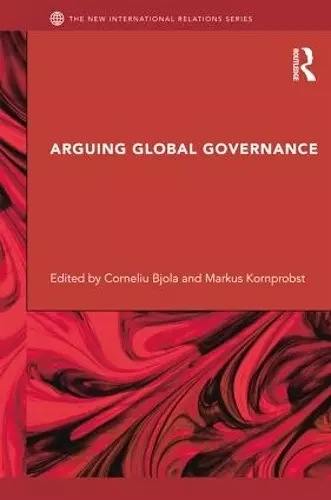Arguing Global Governance
Agency, Lifeworld and Shared Reasoning
Markus Kornprobst editor Corneliu Bjola editor
Format:Paperback
Publisher:Taylor & Francis Ltd
Published:23rd Jun '14
Currently unavailable, and unfortunately no date known when it will be back
This paperback is available in another edition too:
- Hardback£160.00(9780415572170)

This book deals with the questions of how global governance can and ought to effectively address serious global problems, such as financial instability, military conflicts, distributive injustice and increasing concerns of ecological disasters.
Providing a unified theoretical framework, the contributors to this volume utilise argumentation research, broadening the concept by identifying the concerns about agency, lifeworld and shared reasoning that different strands of argumentation research have in common. Furthermore, they develop the concept of argumentative deontology in order to make sense of the processes through which argumentation comes to shape global governance.
Empirically, the book demonstrates how ideas define actors’ interests, shape their interactions with each other, and ground intentions for collective action. Normatively, it provides an excellent theoretical platform for unveiling less visible manifestations of power in global politics and thereby improves our understandings of the ethical implications of global ordering.
Addressing topical issues such as conflict and inter-civilizational dialogue, decision-making in international regimes and organizations, the World Social Forum, the Women’s Environment and Development Organization and Tobin Tax, this book will be of interest to students and scholars of argumentation theory, globalization and global governance
‘An important theoretical contribution to the literature on global governance, with apposite contemporary applications. The editors and contributors synthesise Searle's institutional philosophy with argumentation theory into a novel deontology to explain how the structure of global governance arrangements are in part constituted by processes of argumentation between actors. This is a major constructivist contribution to our understanding of the social mechanisms by which global governance mechanisms are constructed.’ -Rodney Bruce Hall, University of Oxford, UK
‘Though there is widespread agreement that many of the most pressing problems confronting the world require global solutions, there is far less agreement about the authority and ability of the agencies of global governance to provide them. The contributors to this innovative collection suggest that an answer lies in the power of argument to provide collectively binding common norms and goals that can transcend the myopia, self-interest and cultural misunderstandings that stand in the way of concerted action. A fruitful combination of theoretical and empirical enquiry, whereby a general framework is explored through a number of case studies, this collection offers a powerful and exemplary exploration of one of the most urgent challenges confronting international politics today.’ -Richard Bellamy, University College London, UK
ISBN: 9781138811003
Dimensions: unknown
Weight: 453g
304 pages